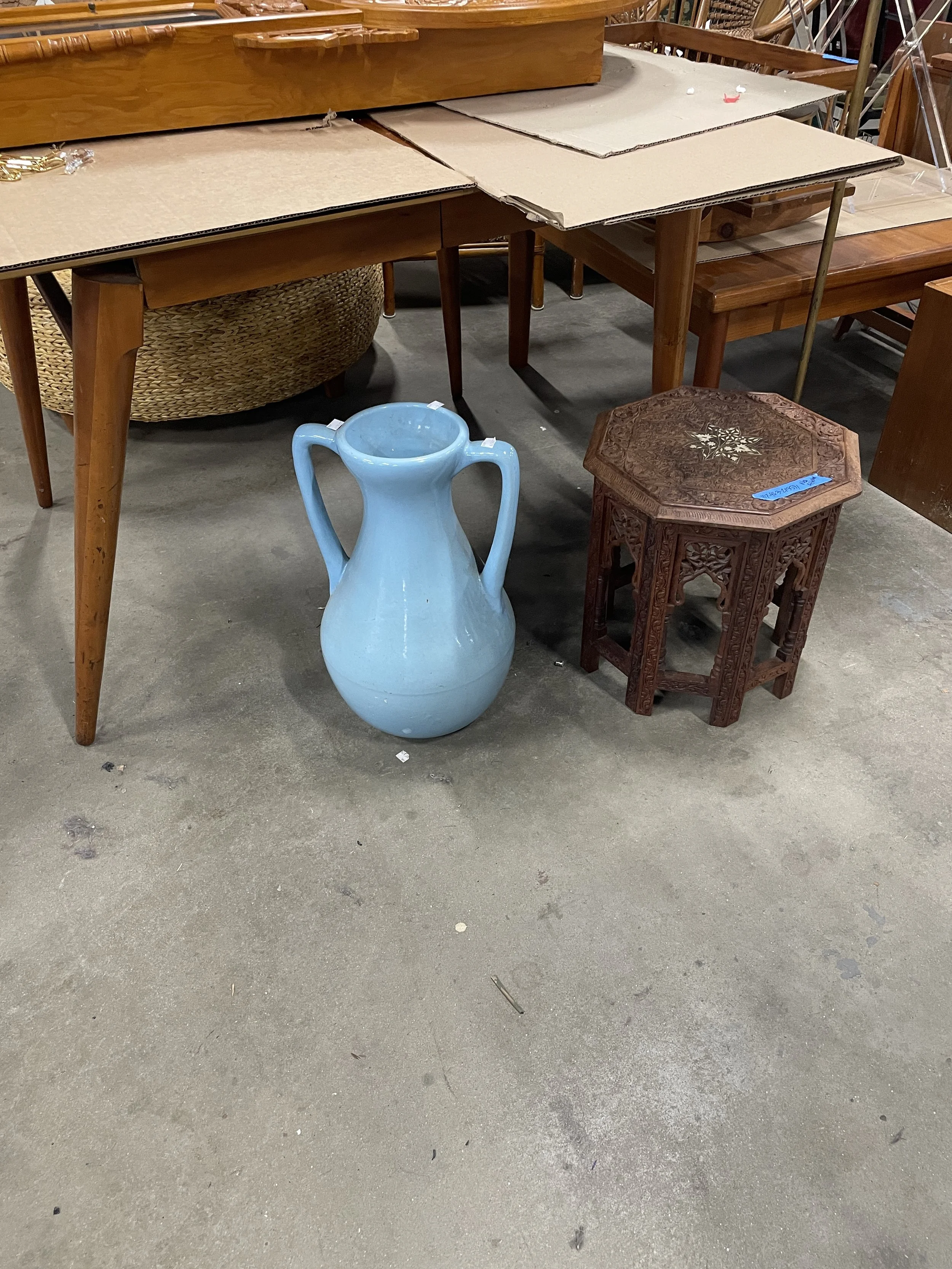Letting go is a main focus of my work with clients. They feel overwhelmed and burdened by the stuff in their lives and want my help to let go, organize, and live with more ease. The “stuff” appears as rooms overflowing with physical belongings, calendars scheduled with no breathing space, or minds filled with a barrage of ideas and thoughts.
Recently, I viewed letting go from another perspective. I had the great joy of meeting with my Westchester NAPO Neighborhood Group organizing colleagues for a field trip and tour of a local auction house, The Benefit Shop in Mt Kisco, NY. This is where the things that have been let go of land on their way to their new home.
Our group was graciously welcomed by Pam Stone, Founder and President of The Benefit Shop Foundation Inc. After working on Wall Street for over two decades, Pam changed careers to pursue her passion project. She set up The Benefit Shop, a charitable 501(c)3 non-profit. Proceeds from sales (100% of the profit) go to over 40 charities, which directly help local community organizations. As Pam said, “I really wanted the beneficiary to be my community, for the people who live and work here.”
How Letting Go is Facilitated
The Benefit Shop is what Pam refers to as “one-stop shopping.” They accept items for:
Consignment or
Estate Buyout
You can bring your things to their 16,000-square-foot gallery and office space. Or, depending on your location, they will bring a truck and a team to you, pack up what you’re letting go of, and transport it to their facility to prepare for auction and sale. With estate buyouts, they will take 90% of a house’s contents.
Pam suggests tagging your items using a colored sticker system.
Red = Keep
Green = Go
Yellow = Think on it.
If you’re not ready to let go of everything at once, they recommend that clients “think on it," which allows them to release things in stages.
They also encourage clients to contribute to the catalogue entries by sharing stories and histories about their objects. Capturing the object’s story enhances its saleability and helps the client feel better about letting go.
“Let go, organize, and live with more ease.”
How Do the Auctions Work?
The Benefit Shop hosts weekly online auctions. They sell around 3,000 items each month to a global audience.
All bids, with a few exceptions, start at $1.
Items sold at auction are reconciled within 45 days.
Clients receive 65%, and The Benefit Shop keeps 35%.
Consignors receive a tax-deductible receipt along with their settlement checks.
Unsold items can be donated or retrieved by the consignor.
The Benefit Shop doesn’t provide shipping for purchased auction items. You can either pick them up at their office or arrange for shipping. They offer resources for several vetted and recommended shipping vendors.
Letting Go Considerations
Are you curious which items are the easiest or most difficult to sell at auction?
Pam said that jewelry (fine and costume) and handbags consistently sell well.
Large china cabinets and dark wood furniture are not good sellers. While mid-century furniture is popular, only high-end, name-recognizable brands such as Eames, Knoll, or Saarinen sell well at auction. The Danish teak mid-century modern style of furniture doesn’t do well.
More Fun Facts About The Benefit Shop
Organization
I was impressed by the organization at The Benefit Shop.
Items for sale are logged in, tagged, and grouped by category.
They get coded and routed for the auctions in which they will be included.
Each category has separate sections at the facility, such as housewares, textiles, clothing, purses, jewelry, art, and furniture.
There is a photography area for taking quality photos of every piece.
The Shop Mascot
When you enter the space, a giant taxidermy elk is one of the first things you see. When I asked about it, Pam said it wasn’t for sale because it has become their gallery mascot.
Pop-Ups and Cash & Carry
Aside from the online auctions, they also hold occasional onsite pop-up events at their place.
In the gallery, there is also a $1 only group of items to purchase as ‘cash and carry’. The items are sold and replenished regularly.
Why Let Go?
It was fun visiting a place representing so many decisions to let go of stuff. The objects received were treated with care and respect. It felt good knowing these things would go to a good home, stay out of the landfill, and the proceeds would help those in need.
The Benefit Shop Foundation
The Westchester NAPO Neighborhood Group visits Pam Stone, Founder and President of The Benefit Shop Foundation in Mt. Kisco, NY
Where Do Your Things Go?
When you let go of things, where do they go? Do you have favorite charities? Have you used auction houses? What helps you release things that have overstayed their welcome? I’d love to hear your thoughts. I invite you to join the conversation.
How Can I Help?
Do you want support organizing, editing, or letting go? I’d love to help! Virtual organizing is an extraordinary path forward – Local feel with a global reach.
Please schedule a Discovery Call, email me at linda@ohsorganized.com, or call 914-271-5673. Letting go is possible, especially with support.




















